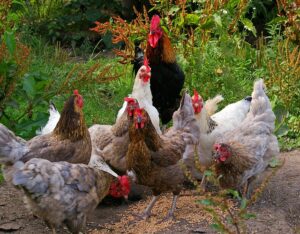Do your chickens look a bit down? Are you noticing something a little off with their laying or digestion? Don’t reach for the antibiotics just yet—have you considered chicken gut health may need a natural boost? Enter the world of fermenting herbs for your feathered friends! Not only does it sound fancy and fun, but it’s also a game-changer for backyard farmers and chicken enthusiasts.
From oregano for gut health to nettle for nutrient boosts, fermenting herbs combines all the goodness of natural remedies with the magic of probiotics. Curious? Let’s get to the nitty-gritty of this homesteader’s secret weapon.
Understanding Fermentation and Chicken Gut Health
Fermentation is like creating a kombucha bar for your chickens—minus the hipster mason jars and Instagram-worthy hashtags. It’s the process of using bacteria to preserve food while enriching its nutritional value. When it comes to chickens, their digestive system thrives on beneficial bacteria, making fermentation a great way to deliver gut-friendly probiotics.
Why Does Chicken Gut Health Matter?
A healthy gut leads to:
- Better digestion
- Stronger immune systems
- Higher egg quality
- Happier, more energetic chickens (because nobody likes a grumpy hen).
Common Gut Issues in Chickens
Ever noticed runny poop or a drop-off in egg production? These are signs your flock might need some gut TLC. Issues like coccidiosis or imbalanced microbiomes can wreak havoc, but good bacteria from fermented food can help ward off trouble.
Essential Herbs for Fermentation
When it comes to herbs, it’s not just about what you put in your tea. Many of these herbs are packed with nutrients and have unique benefits for your chickens.
Top Herbs to Try:
- Oregano: The rockstar of gut health! It’s antiviral, antibacterial, and keeps your birds’ guts in check.
- Thyme: Digestive magic in tiny leaves.
- Garlic: The immunity-boosting queen. Bonus—it also deters pests internally.
- Calendula: Your go-to for gut repair and overall health.
- Sage and Mint family herbs: Aid in nutrient absorption and digestion.
- Nettle and Dandelion: Nutrient powerhouses that are also great for their livers.
- Yarrow and Rosemary: Fantastic for circulation and relaxation.
Mix and match to fit your flock’s needs. Pro tip? Keep it simple at the start.
Fermentation Equipment and Supplies
No need to break the bank here. You probably already have some of these lying around your kitchen.
What You’ll Need:
- Fermentation jars or vessels
- Weights (to keep everything below the brine)
- Airlocks (fancy, but not absolutely necessary)
- Water, salt, and a thermometer
- Some sturdy gloves and pH strips for safety
Fermenting your herbs is low-maintenance once you have these basics!
Basic Fermentation Methods
Don’t panic—fermentation sounds complicated, but it’s honestly as easy as a science experiment (minus the exploding vinegar and baking soda).
Method 1: Brine Fermentation
- Mix water with the right salt ratio. Pro tip? Use non-iodized salt—it’s a chicken-friendly move.
- Submerge your herbs so they’re fully covered in the brine.
- Keep them at the right temperature (65–75°F works well).
- Check for bubbles—it’s alive! After a week or two, you’re good to go.
Method 2: Starter Culture
- Use a store-bought probiotic blend or save liquid from your last batch.
- Follow similar steps to brining but add your culture to speed things up and deepen the probiotic punch.
Always check the pH before feeding—the golden number is below 4.5.
Herbal Fermentation Recipes
- Simple Starter: Try oregano and thyme with a dash of garlic.
- Seasonal Treat: Mix rosemary, mint, and a seasonal herb like dandelion.
- Potent Power Blend: Combine calendula, yarrow, and nettle for extra gut-loving goodness.
Experiment! Your chickens might not write Yelp reviews, but their happy clucks will speak volumes.
Integrating Fermented Herbs into Chicken Feed
Okay, you’ve nailed the fermentation. Now, how do you actually feed this magic potion to your flock?
Dosage Tips:
- Start slow. Add a tablespoon or so to their regular feed.
- Adjust based on the flock’s size—scaling as needed.
- Incorporate it a few times a week or daily for chickens with specific issues.
Mix it into mash, pellets, or even sprinkle it as a topping. Just try not to overshoot; moderation is key.
Monitoring Your Flock’s Gut Health
Curious if fermenting herbs is working? Look for these signs:
- Better digestion (less weird poop on coop clean-up day).
- Glossier feathers.
- Higher egg production.
Track what works in a notebook—it’s like a food diary, but for chickens.
Troubleshooting Fermentation
Oops, got mold? If your jar smells funky or you see anything fuzzy, toss it out. A cloudy brine? Perfectly fine. Worried about contamination? Use pH strips to double-check your methods or adjust temperatures to avoid spoilage.
The Takeaway
Fermenting herbs for chicken gut health isn’t just a trend—it’s a game-changer for backyard farmers seeking natural ways to keep their flock thriving. It’s simple, cost-effective, and delivers health benefits that your chickens will (silently) thank you for.
If you’re still feeling unsure—don’t worry! The world of fermentation is all about experimenting and learning. Start small, check results, and have fun giving your flock the healthiest, happiest lives possible.
Got tips or want to share your herb blends? Drop your thoughts in the comments! Happy fermenting. 🐓✨
For more on chicken check out my other articles:
Hatching and Brooding Chickens
Chicken Foraging and Free Ranging
Best Chicken Breeds for Egg Laying
Safely Introducing New Hens to Your Flock

